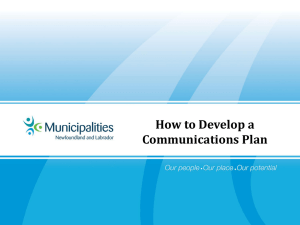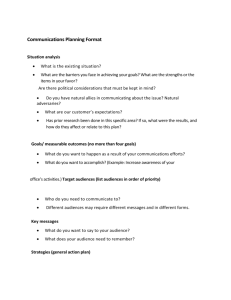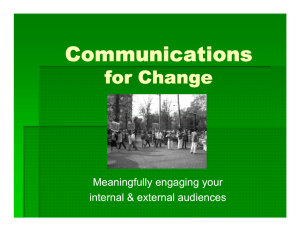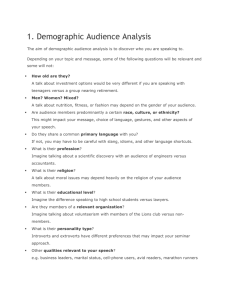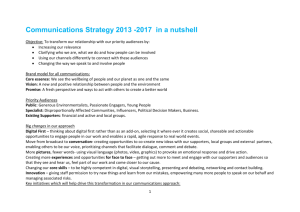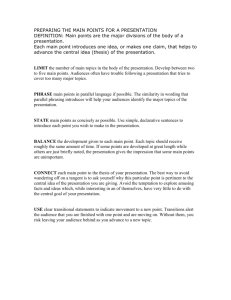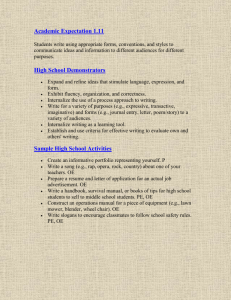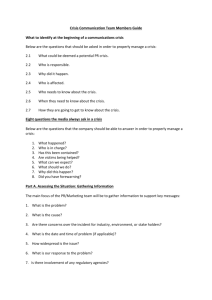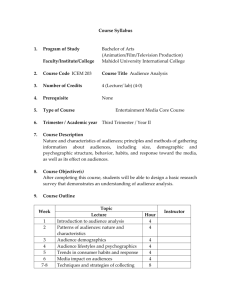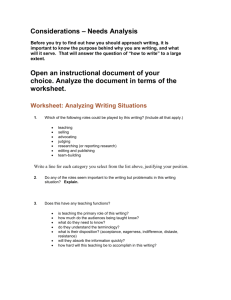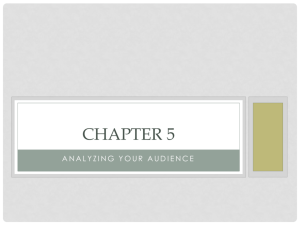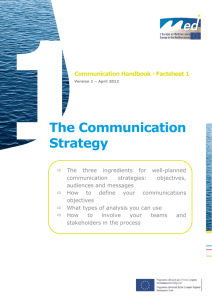Audience Analysis Worksheet
advertisement
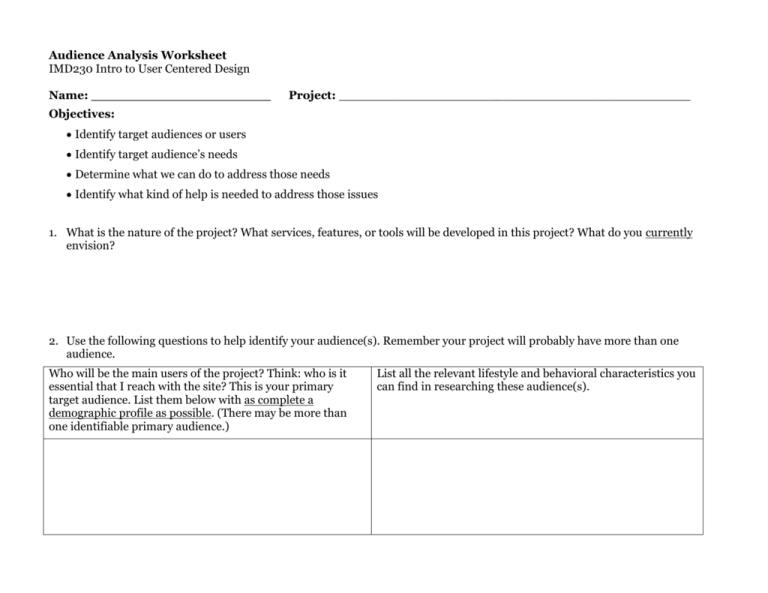
Audience Analysis Worksheet IMD230 Intro to User Centered Design Name: ______________________ Project: _______________________________________________ Objectives: Identify target audiences or users Identify target audience’s needs Determine what we can do to address those needs Identify what kind of help is needed to address those issues 1. What is the nature of the project? What services, features, or tools will be developed in this project? What do you currently envision? 2. Use the following questions to help identify your audience(s). Remember your project will probably have more than one audience. Who will be the main users of the project? Think: who is it essential that I reach with the site? This is your primary target audience. List them below with as complete a demographic profile as possible. (There may be more than one identifiable primary audience.) List all the relevant lifestyle and behavioral characteristics you can find in researching these audience(s). 3. Use the following questions to help identify your audience(s). Remember your project will probably have more than one audience. Who will be the secondary users of the project? Think: who would it be nice to reach? OR who else might the client/sponsor need to reach for purposes other than those for the primary audience(s). List them below with as complete a demographic profile as possible. (There may be more than one identifiable secondary audience.) List all the relevant lifestyle and behavioral characteristics you find in researching these audience(s). 4. Brainstorm scenarios on how the Primary Audience might use the site/project. This simply means to list the ways in which the Primary Users might use the site (example: a student visits the site trying find out when the Summer Quarter starts) List at least 5 different possible scenarios 5. Audiences (aka users) will use any product, tool or service that benefits them. So, for the primary audience(s) you’ve identified, complete the following table. List your Primary Audience(s) How will your project benefit these audience/user groups as currently envisioned? What is the value added for each? 6. Pretend to be the primary audience or user group(s) you identified above. Put yourself in their shoes. What are ways we can tweak the project and it’s features to make it more useful and usable? OR What types of things can we add to make the project more useful? List your Primary Audience(s) Remember the difference between an okay product/tool and a great product/tool is how well it does its job (meets the users’ needs). What are specific things you could add to make the project more useful to these users? 7. Think about usability, accessibility, the project’s purpose, next available steps, what is involved in the users taking an action, etc. Then answer the questions below. List your Primary Audience(s) What information will your audience need to know to perform different tasks on the site and be happy doing it? What do you need to do to make sure this information is readily available to them? 8. Audiences (aka users) will use any product, tool or service that benefits them. So, for the secondary audience(s) you’ve identified, complete the following table. List your Secondary Audience(s) Why would these groups be interested in the site/project? Does this audience benefit from the project as currently envisioned? How? 9. Pretend to be the secondary audience or user group(s) you identified above. Put yourself in their shoes. What are ways we can tweak the project and it’s features to make it more useful? Remember, the idea is to “get more bang for the buck” by looking at ways we can address a larger audience, or make the project useful to secondary audiences. List your Secondary Audience(s) What adjustments could be made to the main project to make it better fit other user groups? What are specific things we can do to make the project or tool more useful to this audience? How much effort is it likely to require to add this? Lots of effort, some effort, little effort? 10. Now you have identified ways to tweak the services, tasks and tools in the project to make them useful to primary and secondary audiences. What information might be necessary for those audience(s) to take full advantage of the project interactive services or features? List your Audience(s) What information will your audience need to know to use the services/tools and be happy with it? What do you need to do to make sure this information is readily available to them? 11. How can you apply this analysis and to improve other areas of the project, for instance the visual design, links to other sites, personalization features, database or other backend features, etc? What specific design implications can you draw from this process? List your Audience(s) What other steps can you take to increase the value of the site/project for the users?
